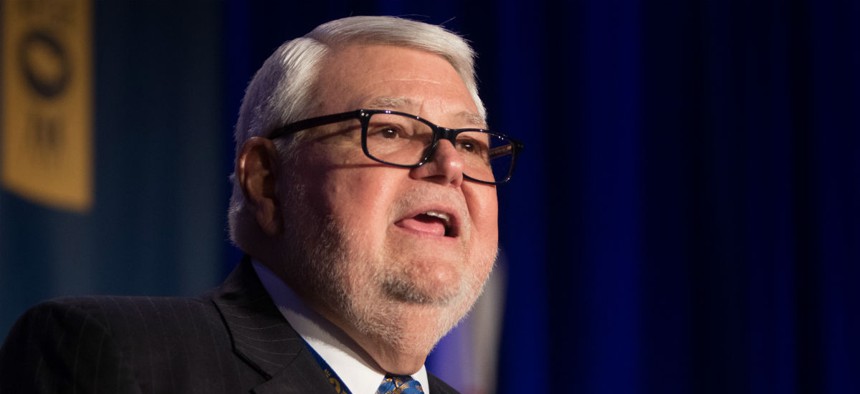
Executive alleges his removal was the result of his criticism of the leadership of AFGE President J. David Cox. Flickr user AFGE
AFGE Executive Fired Over Letter to Members
Union secretary-treasurer claims he was removed because he planned to challenge incumbent president.
The board of the nation’s largest federal employee union voted almost unanimously to remove a top-ranking official from the union's leadership team earlier this month, but the ousted executive said the move was politically motivated.
The American Federation of Government Employees removed National Secretary-Treasurer Eugene Hudson on grounds he used union resources for personal purposes. Hudson admitted that he instructed an AFGE staffer to send an email on his behalf to union members shortly after the 2016 election, but denied that the action violated policy or was a fireable offense.
Instead, Hudson alleged that his removal was the result of his criticism of the leadership of AFGE President J. David Cox and the fact that he planned to run against him in the next union election. He said it constitutes retaliation for his criticism of other union leaders’ misuse of AFGE funds.
“The charges against me focused on a technicality about how the email was sent out but the real motivation for this outrageous action is that I have been making public the inappropriate uses of your money by several elected officials in our union,” Hudson told members in an Aug. 9 letter. “I have been arguing for strict financial accountability and, instead, excuses are being constantly offered for why certain elected officials can treat your money as if it is their own.”
Hudson has in the past called for greater transparency by AFGE executives, criticizing their use of union funds, particularly for travel.
In a July 19 letter to Hudson outlining the charges against him, Cox said a committee of investigation found “probable cause” that Hudson violated the union’s constitution by sending a personal statement using union resources.
“Mr. Hudson has declared, for the record, this communication to be his own, and to be a ‘personal’ statement,” the committee wrote. “However, the record is also clear that he assigned (or ordered) a staff person to send the document. This assignment is a violation of the ethical conduct requirements for all [National Executive Council] members, and has placed the staff person, himself, in the potential of receiving disciplinary action.”
Hudson, who did not respond to requests for comment, called his removal “outrageous on its face.” He said his November email to members was not a part of his campaign to be AFGE president, which he launched last August, arguing that his message was “solely related to strengthening AFGE.”
“Even if the charges against me had been accurate, i.e. that I had violated procedure, there was no harm identified and the most that one would have expected would have been a verbal reprimand,” he wrote.
On his blog, Hudson noted that several other charges against him had been dismissed, and he suggested that his removal was motivated by his candidacy for AFGE president.
“In August 2016, I declared my candidacy for national president and on August 8, 2017 I was removed from office,” he wrote. “This action has never happened to any national officer in the history of AFGE.”
AFGE said in a statement that its policy is not to comment on a situation that involves “potential or ongoing litigation,” but said the union’s national executive council removed Hudson in accordance with union rules.
“In the interest of clarity, Eugene Hudson was removed from the office of national secretary-treasurer by the AFGE national executive council pursuant to the AFGE constitution,” the union wrote. “In removing Mr. Hudson from office, the NEC found him guilty on the basis of internal charges in connection with his use of AFGE staff and email for campaign or personal purposes.”
Hudson said he “will be taking actions in the coming days,” although he did not specify what form that would take.







